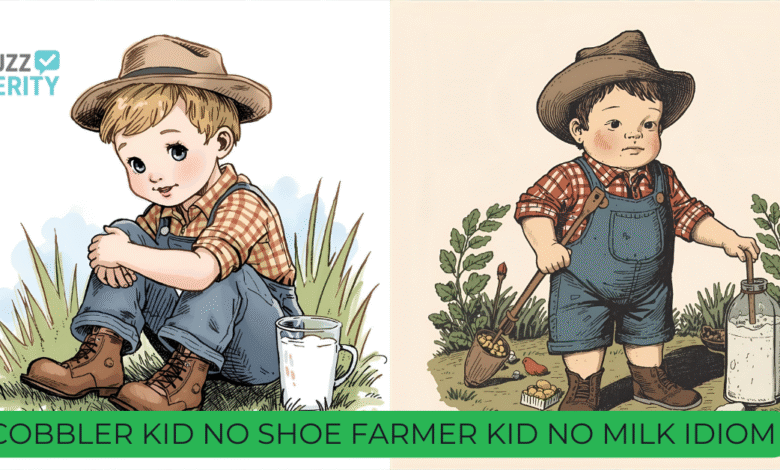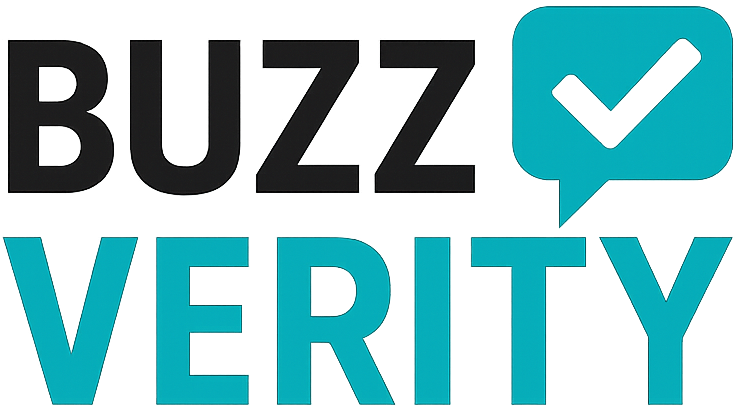Cobbler Kid No Shoe Farmer Kid No Milk Idiom – Meaning Origin and Lessons

The phrase cobbler kid no shoe farmer kid no milk Idiom is an interesting expression that highlights irony in everyday life. It reflects how people who provide a service to others often neglect that very thing in their own lives. This idiom is both humorous and thought-provoking, making it popular in discussions about human behaviour, culture, and even business.
In this article, we will explore the cobbler kid no shoe farmer kid no milk idiom in detail. You will learn its meaning, historical roots, real-life examples, and how it applies to modern life, work, and self-improvement.
What Does Cobbler Kid No Shoe Farmer Kid No Milk Idiom Mean?
The cobbler kid no shoe farmer kid no milk idiom refers to situations where people fail to benefit from their own profession or expertise.
For example:
- A cobbler’s child walks barefoot because the cobbler spends time fixing shoes for others but not for his own family.
- A farmer’s child doesn’t have milk at home because the farmer sells it all in the market.
This idiom reflects neglect, irony, and sometimes misplaced priorities.
The Origin of Cobbler Kid No Shoe Farmer Kid No Milk Idiom
Idioms often come from old traditions, stories, or cultural observations. The cobbler kid no shoe farmer kid no milk idiom has deep historical roots.
In many societies, artisans and workers were so focused on earning a living that their families often missed out on their expertise. The cobbler’s child without shoes became a universal symbol of irony. Similarly, farmers selling all their produce but not keeping essentials for home created the same contrast.
Why the Idiom Still Matters Today
The cobbler kid no shoes the farmer kid no milk the idiom is not just an old saying. It perfectly applies to modern life.
- Professionals and Experts: Doctors may not prioritise their own health. Teachers might not teach their own kids at home.
- Business Owners: Entrepreneurs may help clients succeed, but ignore their own growth.
- Everyday People: Many of us work hard for others but forget to take care of ourselves.
This shows that the idiom continues to be relevant in today’s fast-paced world.
Psychological Meaning Behind the Idiom
The cobbler kid no shoe the farmer kid no milk the idiom also has a psychological angle. It reflects human tendency to focus outward rather than inward.
- People gain satisfaction from helping others first.
- Some avoid their own problems because it’s easier to fix someone else’s.
- Others assume they’ll eventually handle their own needs, but that time never comes.
This idiom reminds us of the importance of balance.
Examples in Modern Life
Let’s see how the cobbler kid no shoe farmer kid no milk idiom applies to real situations:
- IT Experts – A tech professional solves problems for clients, but often neglects to update their own computer.
- Chefs – A chef cooks for hundreds, yet they often eat fast food at home.
- Financial Advisors – They guide clients in investments but mismanage their own savings.
- Parents – They give children everything, but often neglect their own rest and health.
These cases prove that the idiom is not just old but timeless.
Business Lessons from the Idiom
The cobbler kid no shoe farmer kid no milk idiom teaches valuable business lessons.
- Self-Care in Business: Business owners must also use their skills for personal growth.
- Resource Allocation: Keep some benefits for yourself before giving everything away.
- Work-Life Balance: Success is incomplete if your own family or personal needs are ignored.
Ignoring your own needs while serving others can lead to burnout and loss.
Cultural Significance of the Idiom
Different cultures have similar sayings to the cobbler kid no shoe and farmer kid no milk idiom
- In English: “The shoemaker’s children go barefoot.”
- In Spanish: “En casa de herrero, cuchillo de palo.” (In a blacksmith’s house, only wooden knives.)
- In Chinese: A doctor’s child often goes untreated.
This shows the idiom is a global truth about human behaviour.
How the Idiom Relates to Self-Improvement
The cobbler kid no shoes the farmer kid no milk the idiom is also a wake-up call for personal growth.
- Take care of your health before helping others.
- Use your knowledge for your family, not just clients.
- Build habits that improve your own life, too.
Self-improvement starts at home, and this idiom is the perfect reminder.
Idioms Similar to Cobbler Kid No Shoe Farmer Kid No Milk Idiom
Some related idioms that share the same spirit are:
- “Practice what you preach.”
- “Charity begins at home.”
- “Don’t forget to water your own garden.”
All of these align with the wisdom of the cobbler kid no shoe farmer kid no milk idiom
Modern Applications in Work and Lifestyle
Today, the cobbler kid no shoe farmer kid no milk idiom applies in many areas:
- Health & Fitness: Trainers telling others to exercise but not doing it themselves.
- Education: Teachers helping students succeed while ignoring their own growth.
- Parenting: Parents often sacrifice everything, forgetting self-care.
The idiom encourages balance and responsibility in all fields.
Social Media and the Idiom
On social media, the cobbler kid no shoe farmer kid no milk idiom is often used humorously. Memes and jokes highlight professionals who forget their own needs.
For instance:
- A barber with messy hair.
- A dentist with tooth problems.
- A writer who never updates their own blog.
This makes the idiom relatable to younger audiences.
Lessons for Personal Life
The cobbler kid no shoe farmer kid no milk idiom gives us key lessons:
- Care for your own needs before helping others.
- Balance generosity with self-protection.
- Avoid neglecting family while chasing success.
- Remember that wisdom without practice is incomplete.
These life lessons make the idiom a timeless piece of advice.
Final Thoughts
The cobbler kid no shoe the farmer kid, no milk the idiom is more than just a phrase. It is a reminder that serving others is important, but not at the cost of personal well-being.
Whether in business, family, or personal life, this idiom pushes us to reflect on our priorities. If applied wisely, it can bring balance, growth, and happiness.





4 Comments